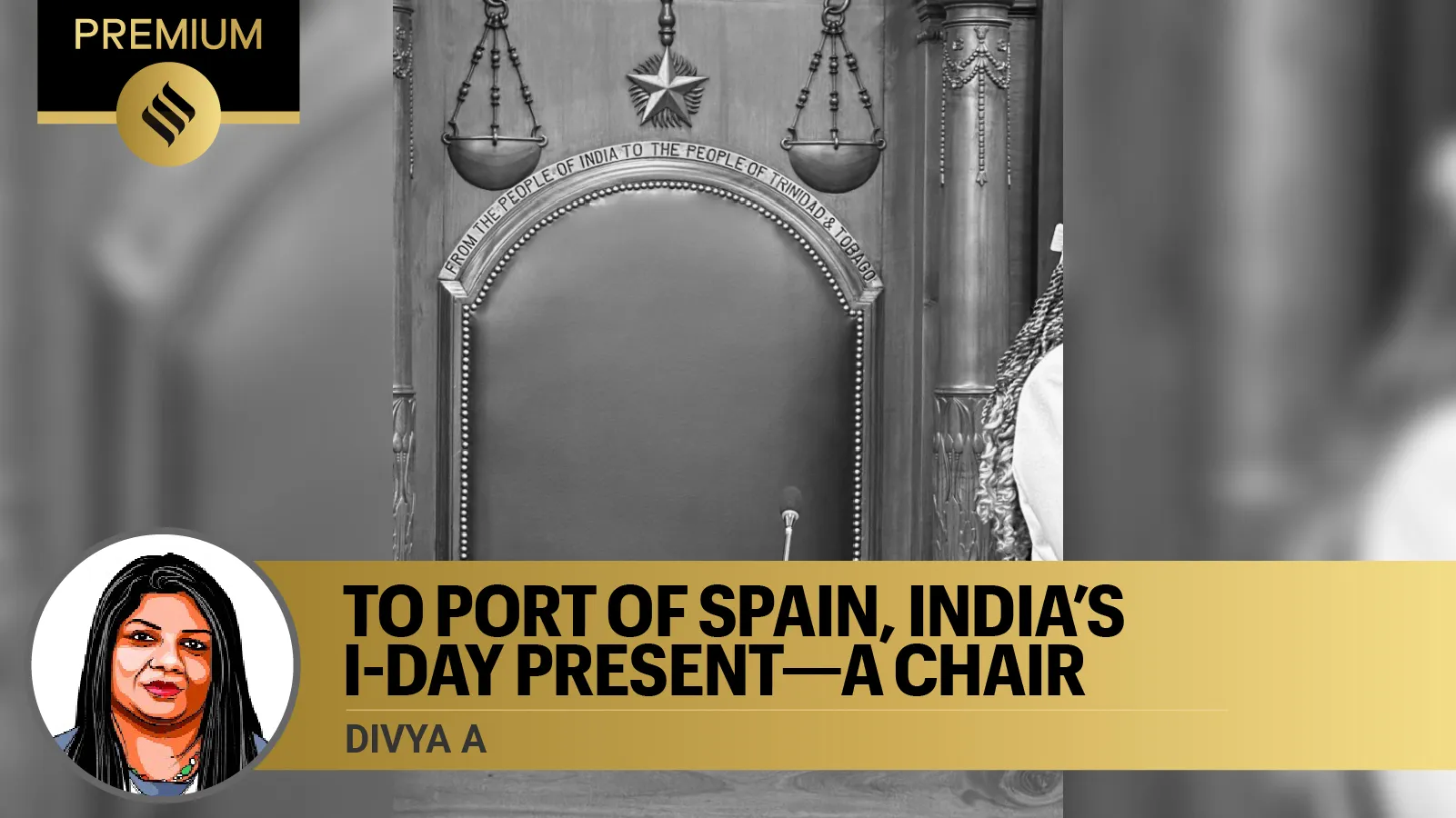To Port of Spain, India’s I-Day present — a chair
During his official visit to Trinidad and Tobago a few days ago, Pabitra Margherita, the Minister of State for External Affairs, posted a picture on X of the Speaker’s Chair that was gifted by India to the Carribean nation to mark its independence from British rule on August 31, 1962.
Six decades on, the chair continues to remain the seat of democracy in Port of Spain and is currently being used by the country’s ninth Speaker, Bridgid Annisette-George.
Interestingly, the wooden chair was in the making for quite a few years before it could be presented to the newly independent nation, both as an exquisite specimen of fine Indian craftsmanship and as a symbol of shared democratic values.
India’s relationship with Trinidad and Tobago dates back to the mid-1800s. On May 30, 1845, the first ship, Fatel Razack, carrying 225 indentured Indian workers reached the shores of Trinidad, then a British colony. Arrival of ships from India continued till 1917, ensuring that the number of Indians there kept increasing.
Indentured Indians
The current descendants of those indentured workers, now in their fifth and sixth generations, form nearly 42 per cent of the country’s total population, constituting an integral part of the economic, political and social fabric of the country, Indian High Commissioner Pradeep Rajpurohit told The Indian Express over telephone from Port of Spain.
In deciding upon the nature of the gift to be presented to Trinidad and Tobago on its attainment of independence, the Indian government — then under Prime Minister Indira Gandhi — chose the Speaker’s Chair since it was a symbol of the supremacy of law and the democratic way of life that both the countries had chosen to pursue.
As per Trinidad and Tobago’s parliamentary proceedings, the ceremony to hand over the chair took place at the hands of then Indian High Commissioner Muni Lal on February, 9, 1968.
As the House met at 1.37 pm, Speaker Clytus Arnold Thomasos informed the members that Indian High Commissioner Lal would address them “on behalf of the Government and people of India”.
A six-year delay
In his eight-minute address, Lal — calling the moment as a “high watermark” of his current assignment — made a note of the six-year lapse between Trinidad and Tobago’s independence (in 1962) and the presentation of the chair (in 1968).
This gap also included a delay of over two months as Lal was not in Port of Spain. He told the House, “I shall be revealing no secret when I disclose that the intended gift (from India) arrived in Port of Spain just a day before my departure, nearly two-and-a-half months ago. It was very thoughtful and generous of you, Mr Speaker, to hold over this ceremony till my return from a spell of leave in India. I thank you sincerely for not depriving me of an honour, which providence apparently had earmarked to be bestowed upon me.”
Lal said India was “conscious of the delay that has taken place in making this presentation of what was intended to be and still is an independence gift”. But, he added, “the fine workmanship involved in the making of this chair is painfully time-consuming”. On top of that, one of the two craftsmen who specialised in that specific type of woodcarving was out of commission for over a year on account of an illness.
“Perhaps, at this late stage, it would be anomalous to label this chair an independence gift,” the High Commissioner said on a lighter note, adding that “India of (Mahatma) Gandhi and India of (Jawaharlal) Nehru salutes this peaceful, forward-looking nation ”.
Lal also noted how in view of Trinidad and Tobago’s achievements over the last six years in the fields of political advancement and economic development, he would perhaps not be wrong in not calling this chair an independence gift but a “coming-of-age” present from an admiring brother (India).
The gift was finally presented at 1.45 pm, as per records. “Mr Speaker, we hope that this gift will forever serve as a reminder of the underlying unity of the peoples and government of our two countries,” Lal said.
With the presentation of the gift, the House passed a resolution to thank the Government of India and its people. “The gesture which we receive today in the form of this chair, which will adorn this House from now on, will be perhaps the most tangible expression for us all to see. Beautifully carved, it will be a constant reminder of the art and culture of the people of India, so many of whose sons and daughters now form an integral part of our nation,” the resolution said.
A shared history
“Brought here more than 100 years ago, in one of the worst periods of colonialism and in conditions approximating slavery, like those of their African brothers, they (the Indians there) have nevertheless risen above all their misfortune and today take an equal place in our new nation in every sphere of activity,” it said.
The resolution added, “Our association with India, therefore, is a long one bound with ties of blood.”
With that, the representatives of the House applauded in unison and the sitting was suspended at 1.55 pm.



